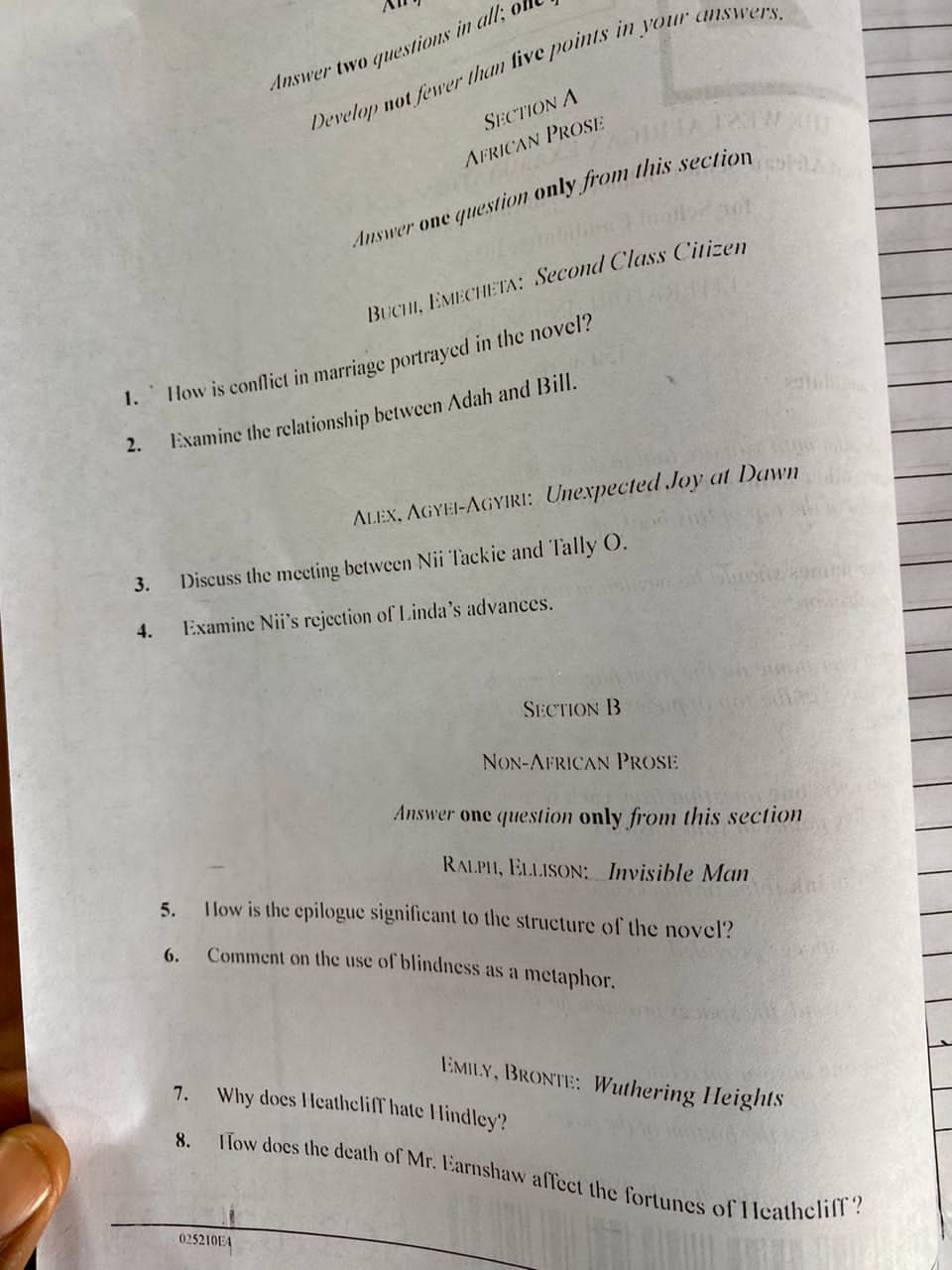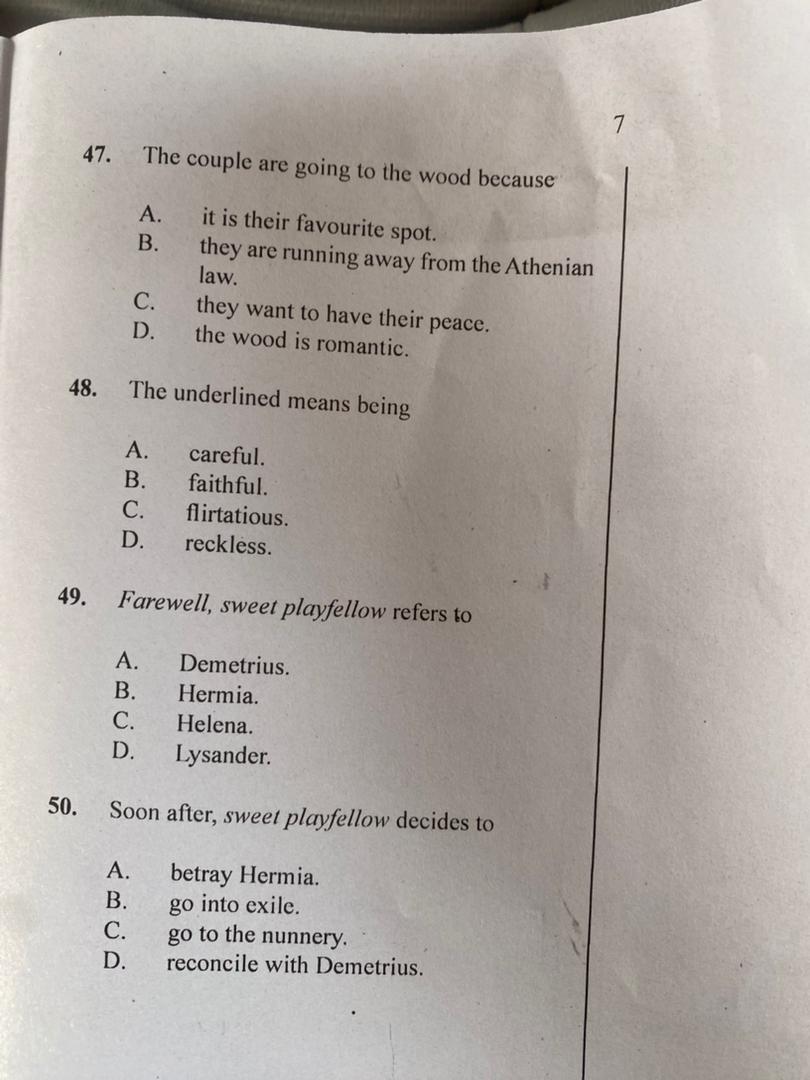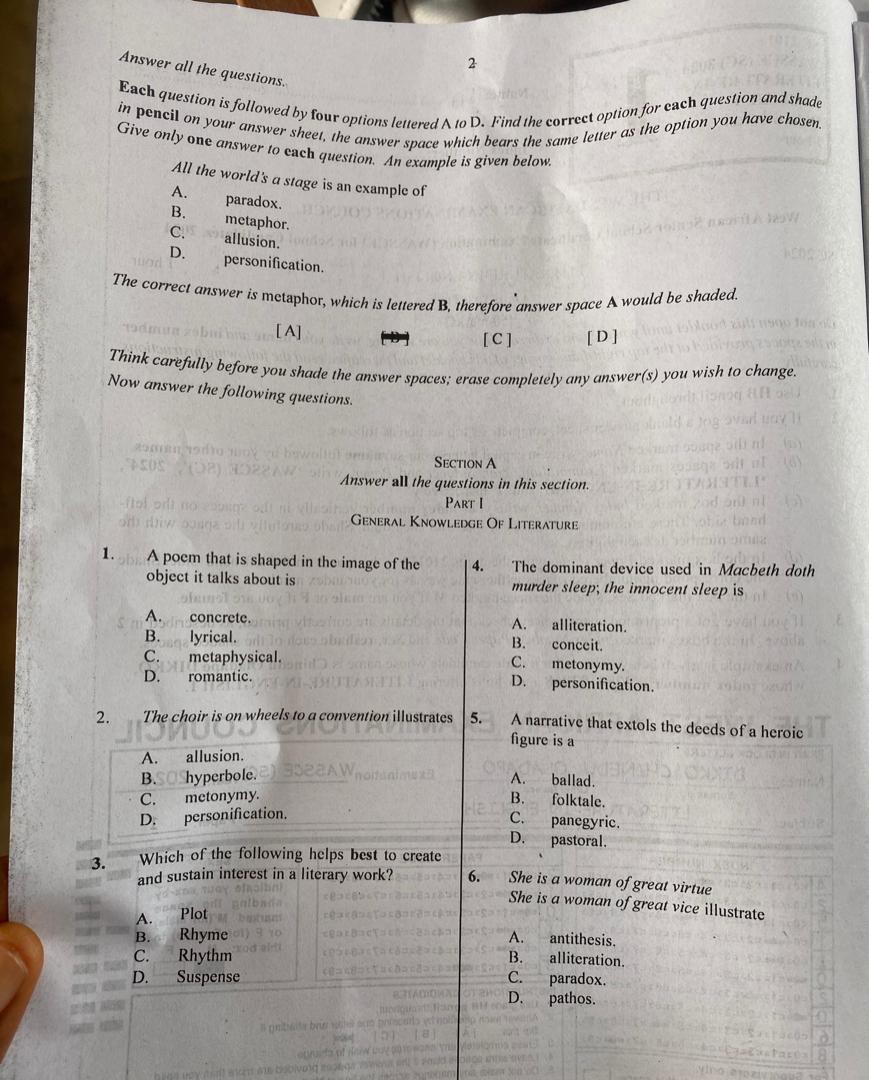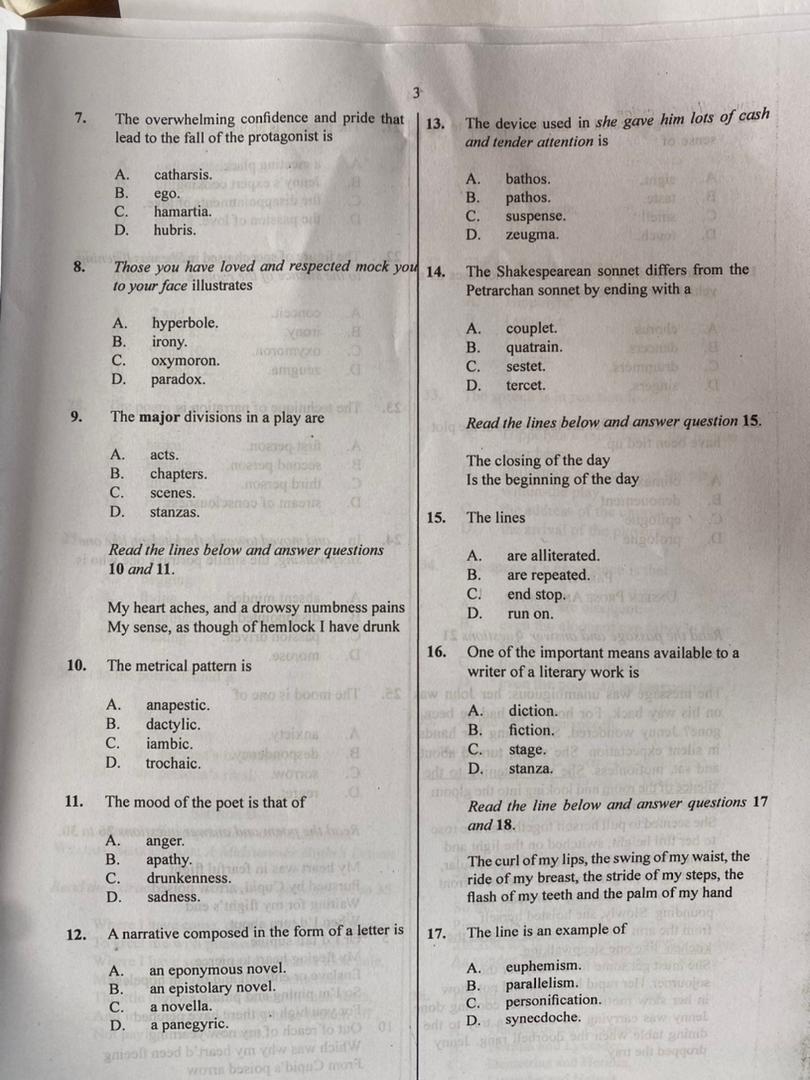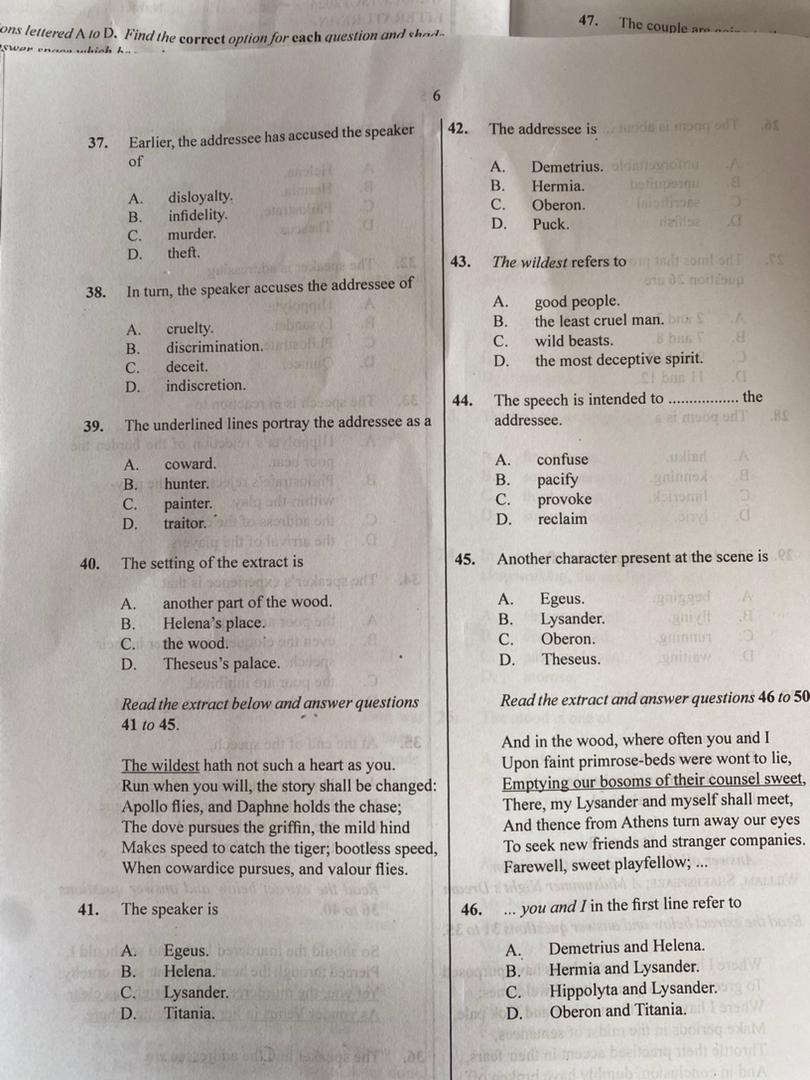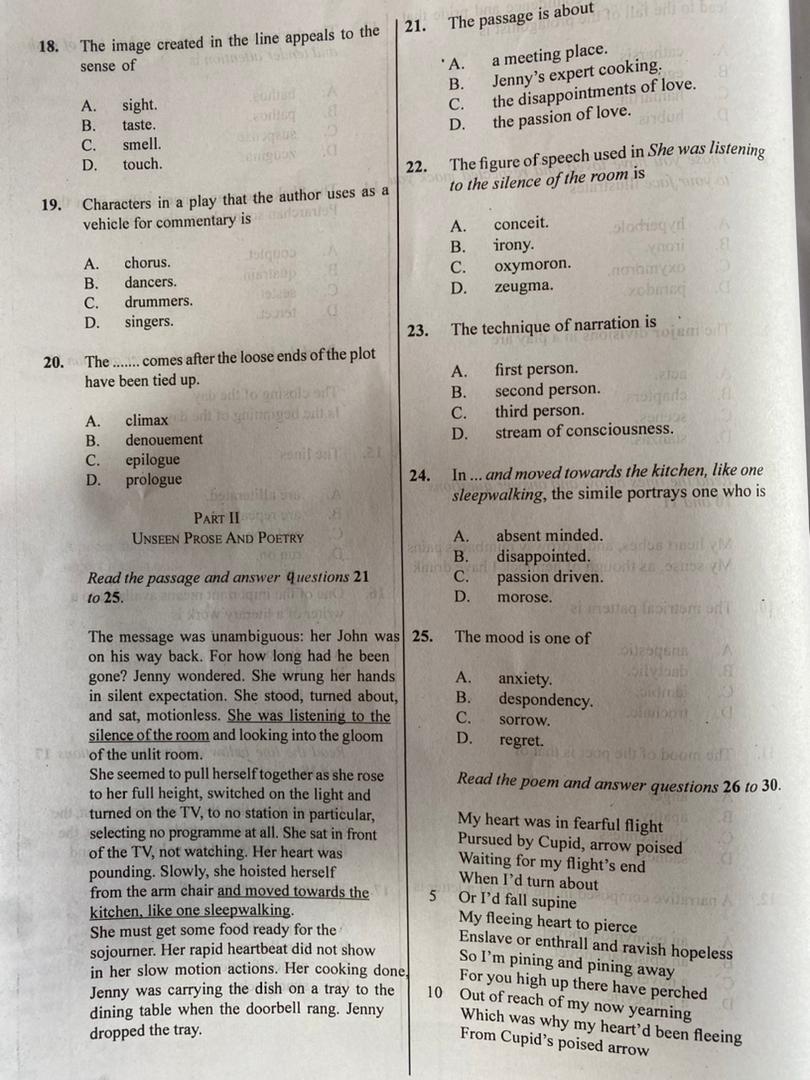Join Our Telegram Channel
Join Our Whatsapp Group
WAEC Literature 2024 Answers, question on Literature waec 2024, WAEC Literature Answers 2024. WAEC 2024 Literature in English obj, 2024 WAEC Literature obj and Prose Answers, Literature in English 2024 WAEC We Assure you of getting the waec Literature questions and answers 2024 on time, only those that subscribed. WE DONT SCAM, ONLY A TRIAL WILL CONVINCE YOU
Friday, 17th May 2024
Literature-In-English 2 (Prose) 9:30am – 10:45am
Literature-In-English 1 (Objective) 10:45am – 11:45am
LITERATURE OBJ:
1-10: ACDDCADBAC
11-20: DBDADABAAC
21-30: DCCAABCDBA
31-40: DCDBCCDADC
41-50: BACCCBBBDB
ENJOY YOUR WEEKED.
POSTED:
No.1 VERSION 1, 2, 3
No.2 VERSION 1
No.4 VERSION 1
No.5 VERSION 1
No.6 VERSION 1
No.7 VERSION 1
No.8 VERSION 1, 2
DONE WITH ESSAY LONG AGO
JUST POSTING DIFFERENT VERSIONS FOR THOSE IN THE SAME SCHOOL SO THEY DON’T WRITE THE SAME THING
OBJ ALSO DROPPING SOON
ATTENTION: 

Many students score low on literature exams because they submit similar answers. To address this, we will provide high-quality answers and rephrase them into multiple versions. Your task is to use these different versions or learn to rephrase them yourself. By doing this, we can improve your literature exam performance.
Also, be careful of solutions spreading online
Only use what I sent here, or you will learn in a hard way when the result is out.
(NUMBER 1 VERSION 1)
(1)
In the novel Second Class Citizen, conflict is portrayed through the tumultuous marriage between Adah and Francis, revealing a relationship founded on selfish motives rather than mutual support and love. Adah is driven by a desire to work hard and contribute financially to her family, while Francis seeks to parasitically benefit from Adah’s efforts without reciprocating.
Adah’s dissatisfaction with her mother’s remarriage, which she perceives as a betrayal of her late father, exacerbates her sense of obligation to financially support her family. She dreams of marrying a wealthy man who would allow her mother and brother to live with her, thus solving many of her problems. However, the suitors she encounters are much older, and she cannot accept a marriage where she would be treated as a servant and have to refer to her husband as "Sir" even behind his back. In the Ibuza community from which Adah hails, marriage is viewed as a master-servant relationship where the woman is expected to serve the man, bear many children, and care for them with little or no assistance from the father. This patriarchal mindset deems the education of a girl-child unnecessary, believing it makes women arrogant and irresponsible. Consequently, Adah is not enrolled in school at a young age, even though her brother, Boy, is already attending school.
Despite these societal pressures, Adah marries Francis, a young man studying to become an accountant. Francis is impoverished and cannot afford the five hundred pounds bride price that Adah’s family demands, given her college education, despite none of them contributing to her schooling. Adah’s family refuses to attend the wedding due to this unpaid bride price.
While it cannot be said that Adah and Francis’s union is entirely devoid of love, Francis’s actions and inactions reveal a parasitic relationship rather than a symbiotic one. Adah’s hard work, passion for the family, and substantial salary sustain their marriage, as Francis refuses to find employment to support the family. He does nothing to promote the family’s well-being and frequently writes home to his parents about issues that could be resolved between him and Adah, such as when Adah obtains a family-planning method without his consent.
To Francis, a woman in marriage is a second-class human being, expected to be available for sex at any time, bear numerous children, and face physical abuse if she refuses. Women are to wash clothes, have meals ready at all times, and are deemed incapable of intelligent conversation. Francis dismisses Adah’s aspirations of becoming a writer, fearing his family’s disapproval if his wife were to publish a book.
Adah, despite being the breadwinner, faces maltreatment, beatings, assaults, insults, abandonment, and rejection. Francis neglects their children, ultimately rejecting them in court and expressing indifference about their adoption. The loveless nature of their marriage, as seen through Adah’s perspective, stems from Francis’s refusal to care for and respect the family. Adah resolves to raise her five children on her own, pledging never to let them down. She declares, "The children are mine, and that is enough. I shall never let them down as long as I live," signaling her determination and resilience in the face of Francis’s abandonment.
It portrays conflict through the deeply flawed marriage of Adah and Francis, highlighting issues of gender inequality, societal expectations, and the struggle for personal independence and dignity within oppressive structures.
(1)
(NUMBER 1 VERSION 2)
In the novel Second Class Citizen, conflict is illustrated through the troubled marriage of Adah and Francis, revealing a relationship based on selfish interests rather than mutual support and love. Adah is motivated by a desire to work hard and contribute financially to her family, while Francis aims to benefit parasitically from Adah’s efforts without reciprocating.
Adah’s discontent with her mother’s remarriage, which she sees as a betrayal of her late father, intensifies her sense of responsibility to financially support her family. She dreams of marrying a wealthy man who would allow her mother and brother to live with her, thus solving many of her problems. However, the suitors she meets are much older, and she cannot accept a marriage where she would be treated as a servant and have to call her husband "Sir" even in private. In Adah’s Ibuza community, marriage is seen as a master-servant relationship where the woman is expected to serve the man, have many children, and care for them with little or no help from the father. This patriarchal belief deems the education of a girl unnecessary, believing it makes women arrogant and irresponsible. Consequently, Adah is not enrolled in school at a young age, while her brother, Boy, is already attending school.
Despite these societal pressures, Adah marries Francis, a young man studying to become an accountant. Francis is poor and cannot afford the five hundred pounds bride price that Adah’s family demands due to her college education, even though none of them contributed to her schooling. Adah’s family refuses to attend the wedding because of this unpaid bride price.
While it cannot be said that Adah and Francis’s marriage is completely devoid of love, Francis’s actions and inactions reveal a parasitic rather than a symbiotic relationship. Adah’s hard work, dedication to the family, and significant salary sustain their marriage, as Francis refuses to find work to support the family. He does nothing to promote the family’s well-being and frequently writes to his parents about issues that could be resolved between him and Adah, such as when Adah obtains a family-planning method without his consent.
To Francis, a wife is a second-class human being, expected to be available for sex at any time, bear many children, and face physical abuse if she refuses. Women are to wash clothes, have meals ready at all times, and are considered incapable of intelligent conversation. Francis dismisses Adah’s dreams of becoming a writer, fearing his family’s disapproval if his wife were to publish a book.
Despite being the breadwinner, Adah faces mistreatment, beatings, assaults, insults, abandonment, and rejection. Francis neglects their children, ultimately disowning them in court and showing indifference about their adoption. The loveless nature of their marriage, as seen through Adah’s eyes, arises from Francis’s refusal to care for and respect the family. Adah resolves to raise her five children alone, vowing never to let them down. She declares, "The children are mine, and that is enough. I shall never let them down as long as I live," showing her determination and resilience in the face of Francis’s abandonment.
It portrays conflict through the deeply flawed marriage of Adah and Francis, highlighting issues of gender inequality, societal expectations, and the struggle for personal independence and dignity within oppressive structures.
(1)
(NUMBER 1 VERSION 3)
The novel, Second Class Citizen, portrays the quest for equal treatment, self confidence and dignity of women where the Writer conveys the autobiography of Adah Ofili to debunk racial discrimination, gender discrimination, irresponsible husbandhood, early marriage, Patriarchy (male dominance) to convey her literary taxonomies
The issue in question is the conflict of marriage which will be explicated in the subsequent paragraphs
The conflict of marriage is portrayed in the novel. Here, marriage without love is pivotal in the novel. The marriage between Adah Ofili and Francis is not found on genuine love. Both of them seem to have stuck on each other on basis of conveniences. Adah stuck to Francis because she had no relative kind enough to take her. In short, Adah has no home to call her own.
Another salient conflict in the novel is that even Adah earns most of the family’s money, Francis considers it his. He also beats Adah physically and attack her emotionally. He burns his wife’s manuscript too out of spite and jealousy. In the end, Francis refuses to even take responsibility for his own children.
Marriage in Second Class Citizen is also significant because it involves Adah, the protagonist, Francis, the husband as well as the wider communities in both Nigeria and England. The conflict of marriage is paramount in a patriarchal society where men are superior and women must accept and play their role as inferior partners. Men own and use their women as property. Here, Adah Ofili struggles against the patriarchal notion. Adah is portrayed as a woman who questions the dependent act of men and struggle to free herself. Adah is born into the contest of the conflict of marriage and her personality is shattered by the conflict of marriage.
The determination and optimism that she had expressed in the beginning of the novel has vanished, she is now a " post colonial entity" because of the conflict of marriage as Francis treated Adah as a domestic animal in the novel
In the final analysis, the conflict of marriage pushes Adah to become a victim of circumstance in a patriarchal society in the hand of Francis that is the most unredeemable villain in African literature, instead of helping Adah to develop the creative potential which she obviously has which she uses to support him. Francis only proves to be an obstacle calling women brainless and Adah’s work rubbish. Francis destroys her manuscript.
In the final act to reclaim her agency, Adah decided to claim divorce from her husband. She suffers various obstacles, but finally abandons him leaving with her four children
(NUMBER 4 VERSION 1)
(4)
Nii’s rejection of Linda’s advances is portrayed through several pivotal points that emphasize his moral integrity, sense of loyalty, and the pressures he faces. Linda persistently tries to convince Nii to travel to Lagos with her, exploiting his difficult situation at home. Despite her relentless efforts, Nii begins to understand her ulterior motive. She offers herself to him as an incentive, revealing her willingness to exploit his vulnerability. Linda’s explicit offer, “I will let you have me for free here and in Lagos, too… I know your wife is sick, quite sick and has not been well for a long time”, underscores her manipulative intentions.
Nii is taken aback by Linda’s lewd proposition. He grapples with the moral dilemma she presents, likening it to the biblical temptation of Joseph. As he tries to discern her true intentions, Linda reveals her need for a British Visa to join her husband in London, a visa she cannot obtain in Ghana. This revelation adds complexity to Nii’s predicament, as Linda’s desperation contrasts with his own ethical boundaries and sense of loyalty to his sick wife.
Linda’s desperation becomes clear when she confides that her only opportunity to obtain a British Visa is to go to Nigeria and acquire it there, leveraging Nii’s Nigerian nationality to facilitate her entry. She proposes a deceitful plan for Nii to pose as her husband, which would circumvent bureaucratic obstacles. This plan puts Nii in a tight spot, challenging his integrity and loyalty to his wife and his principles.
Faced with an impossible choice and unable to walk home due to the curfew, Nii devises a clever escape plan. Stripping off his clothes, he puts them in his bag and runs towards the soldiers at the barrier, shouting about the curfew and pretending to be intoxicated. This ruse works, and the soldiers escort him home, admonishing him to respect the law. Nii’s quick thinking not only extricates him from the immediate danger but also symbolizes his rejection of Linda’s unethical proposition and his commitment to uphold his moral values.
Throughout the encounter, Nii’s loyalty to his ailing wife remains steadfast. Despite Linda’s temptations and his own challenging circumstances, Nii does not waver in his commitment to his wife. His refusal to accept Linda’s offer, even when she exploits his wife’s illness to manipulate him, underscores his deep sense of loyalty and ethical integrity. Nii’s actions reflect his unwavering dedication to his wife’s well-being, despite the allure of escaping his own troubles.
Linda employs manipulative tactics, preying on Nii’s vulnerable situation and offering sexual favors to secure her visa. Nii’s resistance to her advances highlights his moral fortitude and his awareness of the ethical implications of her proposal. By rejecting Linda, Nii demonstrates his unwillingness to compromise his values, even in the face of personal hardship and temptation.
Nii’s encounter with Linda also serves as a broader commentary on societal and ethical issues. Linda’s willingness to use deceit and manipulation to achieve her goals reflects societal pressures and moral compromises people are sometimes forced to consider. Nii’s rejection of her advances and his clever escape highlight the importance of maintaining personal integrity and ethical standards, even in difficult circumstances.
Nii’s rejection of Linda’s advances in Unexpected Joy at Dawn is a complex interplay of moral integrity, loyalty, and quick thinking. Nii’s actions underscore his commitment to his wife and his principles, providing a powerful example of ethical steadfastness in the face of temptation and adversity. Through this narrative, the novel explores the themes of loyalty, integrity, and the ethical challenges individuals face, illustrating the profound impact of personal choices on one’s character and relationships.
(5)
(NUMBER 5 VERSION 1)
The epilogue of Ralph Ellison’s Invisible Man is a critical component of the novel, providing a profound reflection on the narrator’s journey and its broader implications. In this concluding section, the narrator’s stay in the underground serves as a metaphorical and literal representation of his realization of invisibility and the society’s persistent refusal to see him as an individual.
One significant point in the epilogue is the narrator’s introspective journey. The narrator acknowledges that throughout his life, he has been conforming to the desires and expectations of others, effectively erasing his identity. He states, “I have also been called one thing and then answer while no one really wished to hear what I called myself. So after years of lying to adopt the opinions of others, I finally rebelled. I am an invisible man”. This confession highlights his realization that he has been living a lie, shaped by others’ perceptions and definitions of him. His rebellion against these imposed identities signifies a crucial moment of self-awareness and rejection of societal conformity.
The epilogue also delves into the narrator’s reflections on his grandfather’s last words, which have haunted him throughout the novel. His grandfather’s advice to “overcome ’em with yeses” and to “undermine ’em with grins” has been a source of confusion and contemplation. In the epilogue, the narrator continues to struggle with the meaning of these words, indicating his ongoing quest for understanding and self-definition. This internal conflict underscores the complexity of his journey toward self-realization and the challenges of navigating a society that denies his individuality.
Another critical point in the epilogue is the encounter with Mr. Norton in the subway. Mr. Norton, a key figure from the narrator’s past, fails to recognize him, symbolizing the extent of the narrator’s invisibility. Norton’s escape onto another train leaves the narrator feeling depressed and reinforces his sense of being unseen and unrecognized. This moment encapsulates the broader societal blindness to the individuality and humanity of black people, a central theme of the novel.
The narrator’s purpose in writing his story is also a significant aspect of the epilogue. He muses on the pain and suffering he has endured but refuses to let these experiences define his existence. He approaches life with a complex mix of hate and love, determined to retain his humanity. He expresses a desire to become more human, like his grandfather, who embodies a resilient spirit. This determination to maintain his humanity despite the dehumanizing experiences he has faced is a powerful testament to his strength and resilience.
Finally, the narrator resolves to end his hibernation and re-engage with the world. He states, “I’m shaking off the old skin and I’ll leave it here in the hole. I’m coming out, no less invisible without it, but coming out nevertheless… who knows but that, on the lower frequencies, I speak for you?”. This decision to emerge from his self-imposed isolation signifies a renewed commitment to confront society and assert his identity. The rhetorical question with which he ends the narrative suggests that his experiences and insights may resonate with others who feel similarly unseen and unheard.
The epilogue is significant as it encapsulates the narrator’s journey toward self-awareness and his rejection of societal conformity. Through his introspective reflections, the unresolved questions about his grandfather’s words, the encounter with Mr. Norton, his purpose in writing, and his decision to re-engage with the world, the narrator articulates a powerful message about the struggle for identity and recognition in a society that denies individuality. The epilogue not only provides closure to the narrator’s story but also invites readers to reflect on their own visibility and the societal structures that shape their identities.
(6)
(NUMBER 6 VERSION 1)
The use of blindness as a metaphor in the novel plays a central role in exploring themes of identity, invisibility, and societal indifference. The novel delves into the narrator’s and Tod Clifton’s struggles with conflicting pressures and their uncertainty about their roles in a racially dominated society. This exploration is deeply intertwined with the concept of blindness, which serves as a powerful metaphor for the inability of society to see and acknowledge the true identities and humanity of black individuals.
The narrator’s journey is marked by a search for identity in a society that constantly attempts to define him. As he states at the beginning of the novel, “All my life I had been looking for something, and everywhere I turned something tries to tell me what it was.” This quote encapsulates his struggle to find his place and understand himself amidst external pressures and societal expectations. His blackness is a significant part of his identity, but the societal blindness to his individuality and humanity exacerbates his invisibility.
One key example of this metaphor is the narrator’s experience at the Liberty Paint Plant. Initially, he is hopeful that working there will offer him equality and a sense of belonging with the white workers. However, this hope is quickly shattered as he realizes that the plant is merely another setting where his identity is obscured and exploited. This realization marks the beginning of his endless search for identity, highlighting how societal blindness extends beyond race to encompass any system that refuses to see individuals for who they truly are.
The Brotherhood, a political organization that claims to fight racism and inequality, further illustrates the theme of blindness. The narrator initially believes that the Brotherhood will help him find his identity and provide a systematic way of thinking about the world. He embraces their ideology and structures his identity around it, only to discover that the organization is willing to sacrifice him for its own interests. The Brotherhood’s failure to see the narrator as an individual with his own needs and aspirations, instead of just a tool for their cause, underscores the pervasive blindness within even well-intentioned movements.
Tod Clifton’s fate also exemplifies this metaphor. Clifton’s disillusionment with the Brotherhood and his subsequent tragic end demonstrate how societal blindness and betrayal extend to those who seek to challenge or redefine their roles. Clifton’s decision to leave the Brotherhood and his untimely death reflect the harsh reality faced by those who struggle to assert their identities in a society that refuses to see them.
The theme of invisibility is another aspect of this metaphor. The narrator adopts invisibility as a means of expressing himself in a society that is unsafe for black individuals. He is visible only on the surface, but truly invisible to those around him. This invisibility becomes a shield and a means of survival, allowing him to navigate a hostile world. At the beginning of the novel, he tries to explain his invisibility: “I am an invisible man… I have been surrounded by mirrors of hard and distorted glass. When they approach me, they only see my surroundings. I am not complaining, nor am I protesting either. It is sometimes advantageous to be unseen”. This statement reflects his acceptance of invisibility as a double-edged sword – it provides protection but also perpetuates his marginalization.
The societal blindness to the conditions and identities of black individuals is a critical element of the novel. The white race’s inability to recognize and affirm the humanity of black people renders them "vision-less." This metaphorical blindness prevents any meaningful recognition or validation of the narrator’s and others’ identities, forcing them into a state of perpetual invisibility. The narrator’s decision to go underground and later resurface signifies his plan to fight back against racial prejudice and cast off his invisibility. His underground retreat symbolizes a period of introspection and preparation for a more assertive and visible existence.
The metaphor of blindness in Invisible Man is integral to understanding the novel’s exploration of identity, invisibility, and societal indifference. It highlights the pervasive inability of society to see and acknowledge the true identities and humanity of black individuals. Through the narrator’s and Clifton’s experiences, Ellison underscores the destructive impact of this blindness and the necessity of confronting and overcoming it to achieve true self-awareness and societal recognition.
(7)
(NUMBER 7 VERSION 1)
The intense and multifaceted relationship between Heathcliff and Hindley serves as a central axis around which much of the novel’s drama revolves. Heathcliff’s hatred for Hindley is deeply rooted in their tumultuous childhood and is perpetuated by a series of events that heighten their mutual animosity. This essay examines the reasons behind Heathcliff’s profound hatred for Hindley, emphasizing the themes of revenge, social inequality, and the destructive nature of hate.
Heathcliff’s hatred for Hindley begins in their childhood when Hindley is jealous of the affection Mr. Earnshaw, his father, shows to Heathcliff. Heathcliff, an orphan taken in by Mr. Earnshaw, quickly becomes the favored child, much to Hindley’s resentment. This favoritism breeds animosity in Hindley, who perceives Heathcliff as a usurper of his rightful place in the family. As a result, Hindley treats Heathcliff cruelly, attempting to assert his dominance and re-establish his position as the favored son. This early mistreatment sows the seeds of Heathcliff’s enduring hatred.
Upon Mr. Earnshaw’s death, Hindley inherits Wuthering Heights and immediately relegates Heathcliff to the status of a servant, stripping him of any privileges he previously enjoyed. This demotion is a significant turning point for Heathcliff, who internalizes the injustice and begins to harbor a deep desire for revenge. Hindley’s abuse of power and his efforts to degrade Heathcliff only serve to deepen the latter’s resentment and solidify his determination to exact vengeance. This power dynamic underscores the theme of social inequality, as Heathcliff’s marginalized position fuels his hatred and motivates his quest for retribution.
Heathcliff’s return to Wuthering Heights as an adult marks the beginning of his calculated revenge against Hindley. By this time, Hindley has become a shadow of his former self, succumbing to alcoholism and squandering his family’s fortune. Heathcliff exploits Hindley’s weaknesses, lending him money with the aim of eventually taking over Wuthering Heights. This financial manipulation is a direct result of Heathcliff’s long-standing grudge and his desire to see Hindley suffer. The hatred that Heathcliff harbors is not just a passive feeling but an active force driving his actions and decisions.
The death of Catherine, who is the love of Heathcliff’s life, further exacerbates his hatred for Hindley. Catherine’s death is a pivotal moment in the novel, intensifying Heathcliff’s already powerful emotions. Heathcliff blames Hindley, among others, for contributing to the circumstances that led to Catherine’s demise. This blame manifests in violent confrontations, such as the night when Heathcliff, after keeping vigil at Catherine’s grave, is locked out by Hindley. Hindley’s intention to kill Heathcliff that night, as revealed by Isabella, only escalates the conflict. The physical violence that ensues between them is emblematic of the deep-seated hatred that cannot be resolved through mere words.
Heathcliff’s hatred extends beyond Hindley to encompass other characters such as Edgar Linton and even, to some extent, Catherine herself. However, Hindley remains a primary target due to their shared history and the personal nature of their grievances. Heathcliff’s need for revenge is a driving force in the novel, intertwining with themes of hate and selfishness. His actions are not merely reactive but are part of a broader strategy to undermine and destroy those he perceives as his enemies.
The destructive nature of Heathcliff’s hatred is evident in the overall impact it has on the lives of those around him, including Hindley’s son, Hareton. After Hindley’s death, Heathcliff assumes control of Wuthering Heights and raises Hareton in much the same way he was treated, perpetuating a cycle of abuse and vengeance. This cyclical nature of hate and revenge highlights the novel’s exploration of how these emotions can corrupt and destroy individuals and their relationships.
(8)
(NUMBER 8 VERSION 1)
The death of Mr. Earnshaw, the patriarch of Wuthering Heights, marks a significant turning point in the fortunes of Heathcliff, the central character in Emily Brontë’s Wuthering Heights. This explores the profound impact of Mr. Earnshaw’s death on Heathcliff’s life and the subsequent chain of events that unfold as a result.
Firstly, Mr. Earnshaw’s preference for Heathcliff over his biological son, Hindley, creates a rift within the family dynamic. Despite Hindley’s resentment towards Heathcliff, Mr. Earnshaw’s favoritism ensures that Heathcliff enjoys a privileged position within the household. This preferential treatment exacerbates Hindley’s animosity towards Heathcliff, laying the groundwork for future conflicts between the two foster brothers. Mr. Earnshaw’s decision to bring Heathcliff into the family thus sets the stage for the tumultuous events that follow.
Secondly, Mr. Earnshaw’s death precipitates a power shift within Wuthering Heights, as Hindley inherits the estate upon his father’s passing. Hindley’s ascension to the role of master further marginalizes Heathcliff, who is relegated to the status of a servant within his own home. This reversal of fortune intensifies Heathcliff’s sense of betrayal and fuels his desire for revenge against Hindley and those associated with him. The loss of his foster father not only deprives Heathcliff of a protector but also exposes him to Hindley’s vindictive nature, setting the stage for their bitter rivalry.
Furthermore, Mr. Earnshaw’s death indirectly contributes to the deterioration of Heathcliff’s relationship with Catherine Earnshaw, his childhood companion and unrequited love. With Mr. Earnshaw’s passing, Catherine’s familial obligations and societal expectations compel her to consider marriage to Edgar Linton, despite her deep affection for Heathcliff. This development not only devastates Heathcliff but also sets in motion a chain of events that culminate in tragedy for all involved. The absence of Mr. Earnshaw deprives Heathcliff of a potential ally in his pursuit of Catherine’s love, further isolating him in his grief and resentment.
Moreover, Mr. Earnshaw’s death underscores the theme of mortality that permeates the novel, as characters grapple with loss and the transient nature of life. The deaths of Mr. and Mrs. Earnshaw, along with other characters throughout the narrative, serve as reminders of the fragility of existence and the inevitability of death. Heathcliff, in particular, is haunted by the specter of mortality, as he wrestles with the memories of his departed loved ones and the futility of his own existence.
The death of Mr. Earnshaw reverberates throughout Wuthering Heights, profoundly impacting the trajectory of Heathcliff’s life and shaping the course of the novel. From setting the stage for familial discord to deepening Heathcliff’s sense of betrayal and loss, Mr. Earnshaw’s death serves as a catalyst for the unfolding tragedy that ensnares the characters of Emily Bronte’s iconic novel.
(8)
(NUMBER 8 VERSION 2)
The passing of Mr. Earnshaw, the head of the household in Wuthering Heights, marks a significant shift in the life of Heathcliff, the central figure in Emily Brontë’s masterpiece. It delves into the profound effect of Mr. Earnshaw’s demise on Heathcliff’s existence and the subsequent chain of events that follow suit.
To begin with, Mr. Earnshaw’s favoritism towards Heathcliff over his biological son, Hindley, creates a divide within the family structure. Despite Hindley’s bitterness towards Heathcliff, Mr. Earnshaw’s partiality ensures that Heathcliff holds a privileged position within the family circle. This special treatment heightens Hindley’s resentment towards Heathcliff, laying the groundwork for future conflicts between the two foster brothers. Thus, Mr. Earnshaw’s decision to bring Heathcliff into the family sets the scene for the turbulent events that unfold.
Moreover, Mr. Earnshaw’s death leads to a shift in power within Wuthering Heights, as Hindley inherits the estate after his father’s demise. Hindley’s rise to authority further marginalizes Heathcliff, relegating him to the status of a servant within his own home. This reversal of fortune deepens Heathcliff’s sense of betrayal and ignites his thirst for revenge against Hindley and his allies. Losing his foster father not only strips Heathcliff of a protector but also exposes him to Hindley’s vengeful nature, laying the groundwork for their bitter rivalry.
Additionally, Mr. Earnshaw’s death indirectly contributes to the deterioration of Heathcliff’s relationship with Catherine Earnshaw, his childhood friend and unrequited love. With Mr. Earnshaw’s passing, Catherine’s familial duties and societal pressures push her towards marriage with Edgar Linton, despite her deep affection for Heathcliff. This development devastates Heathcliff and sets off a series of events that culminate in tragedy for all involved. Mr. Earnshaw’s absence deprives Heathcliff of a potential ally in his pursuit of Catherine’s affection, further isolating him in his sorrow and resentment.
Furthermore, Mr. Earnshaw’s death highlights the theme of mortality woven throughout the novel, as characters grapple with loss and the fleeting nature of life. The deaths of Mr. and Mrs. Earnshaw, along with other characters, serve as reminders of life’s fragility and the inevitability of death. Heathcliff, in particular, is haunted by thoughts of mortality as he wrestles with memories of his departed loved ones and the futility of his own existence.
The death of Mr. Earnshaw echoes throughout Wuthering Heights, profoundly altering Heathcliff’s path and shaping the narrative of Emily Brontë’s timeless work. From sparking familial discord to deepening Heathcliff’s sense of betrayal and grief, Mr. Earnshaw’s death acts as a catalyst for the unfolding tragedy that ensnares the characters of this iconic novel.
Answers Loading...
OBJECTIVE QUESTION:
